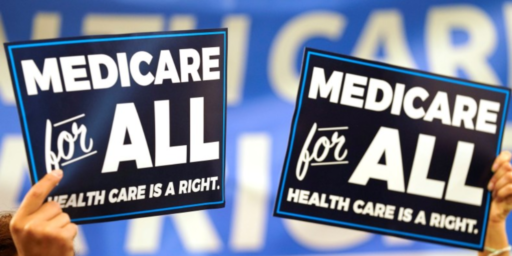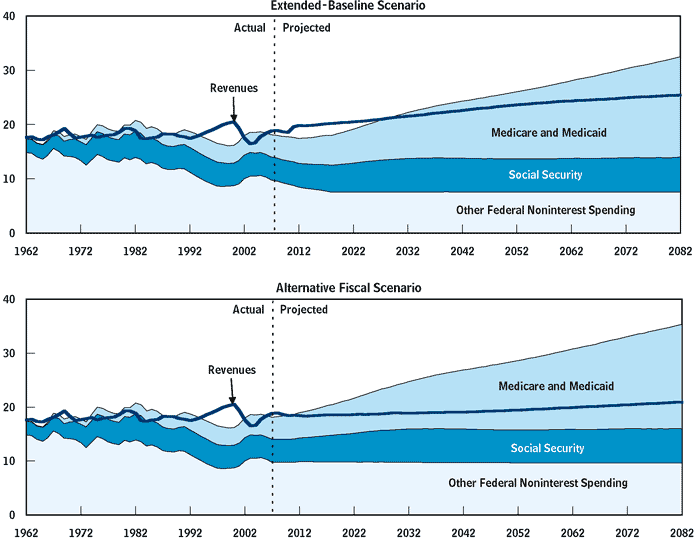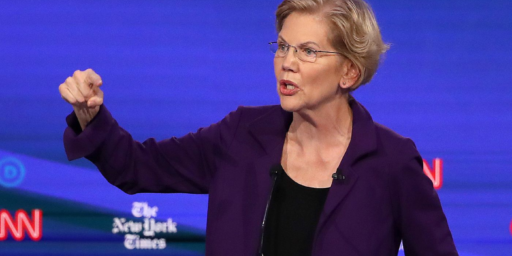Health Care Fallacy #2
Tyler Cowen’s second health care fallacy is from one of my least favorite psuedo-economists Robert Reich,
Social Security is a tiny problem. Medicare is a terrible one, but the problem is not really Medicare; it’s quickly rising health-care costs.
You would think it is hard to resist the fiscal conservatives’ core argument — X is slated to grow a lot in cost, therefore we have at least one reason to spend less on X — but such resistance is becoming a growth industry.
There are two simple points in response. First, it matters whether a given expenditure shows up on the balance sheet of the government or not. It matters for the incentives of our government, for its credit rating, for future marginal rates of taxation, and ultimately for the future of the health care (or other) sector.
Second, if Medicare were less generous, much less would be spent on health care. Now you might think that would be a bad result and that of course a debate worth having. But the mere fact that you favor some amount of Medicare does not lower the cost burden of the amount you favor. If your preferred policy induces say “40 percent more of health care costs,” you can’t put all the blame on the preexisting level or path of health care costs. You also have to accept responsibility for the 40 percent boost or whatever the increment is.
I’ve long argued that Medicare is one of the reasons we have rapidly rising health care costs. It covers much of the elderly’s care and these are the people who tend to be the most intensive users of health care resources. Further, as new procedures and treatments become available the elderly avial themselves of them and we have demographics suggesting that costs are going to be rising–i.e. Medicare’s impact is probably going to be a growing one, not a shrinking one.
If you are going to reduce the growth rate of health care costs I think it is going to be damn hard to do it without making significant changes to Medicare.






What changes, pray tell…
Yes, I’m not sure what it is about Medicare that you think are bad and fixable. Do you think means-testing should be implemented? Or something else that we can change?
This from one of my favorite psuedo-economists Steve Verdon.
I agree with you, Steve, that Medicare is one of the causes for the high cost of health care but perhaps not in the way that you mean.
The problems that Medicare caused aren’t happening or, at least aren’t happening to the same degree, as they did in the first ten or twelve years of the programs enactment. During that period health care costs rose enormously, largely due to lack of Congressional oversight of the program. The sharp rise in costs created a high base cost for health care and now all that’s necessary for health care costs to rise is cost of living adjustments for health care workers.
The main reason that Medicare was enacted in the first place is still valid: without it seniors would quickly become destitute, impoverished by their medical expenses. I don’t think there’s any reform to the plan at this point that could solve the problems we have now. Unless you’ve got a Wayback Machine.
Health Care ‘Winger Fallacy #1:
Medicare extended to the population would actually be cheaper, not more expensive, than what we have now, because right now it self-selects for the most expensive patients (like the opposite of a rapacious insurance company). Adding more young people to Medicare, in other words, with the same amount of per-patient ‘funding’, would make it more, not less, solvent.
There is a problem nobody has brought up, which deserves some consideration. In 1959 when I graduated from Medical School there were three kidney dialysis machines on the East Coast: One in Boston (Harvard), one Washington (Georgetown), and one in Durham (Duke University). There were also only three or four antibiotics in use, by-pass heart surgery was in its infancy, and transplant surgery a dream…
Behind the explosion in medical costs is an expansion of medical knowledge and treatment modalities. Medicare/Medicaid was enacted in 1964. By 1970 chronic renal dialysis was common, and a new generation of antibiotics had been developed. It is a two edged sword. Some advances clearly increased the cost of Health Care, others decreased the cost. Thus, I will challenge Dave Schuler’s statement:
Part of the rise in cost of Medicare may have been lack of “Congressional oversightâ€, but certainly the major part of the cost inflation was the introduction of novel and effective diagnostic approaches and treatment modalities.
That said, of the various bloggers on OTB, Dave Shuler seems to have the best grasp on this subject. A bit nihilistic at times, but hey, nobody has ever claimed that perfection is easy…
Part of the huge cost problem with Medicare and its twin, Medicaid, is the incredible amount of fraud. Both (like most government programs) put minimal effort towards weeding out fraudulent claims and providers. To make up for the fact that so much is paid out fraudulently, they pay a low payment to everyone, legitimate claim or not, to “balance” things out. You routinely hear of massive fraud cases being filed against Medicare and Medicaid providers. When was the last time you heard about fraud charges being filed against a provider by a private insurance company? Part of the insurance company “overhead” we constantly hear about is claims investigators who seek to make sure services were actually provided. Unless we see a sea change in government provided health care (Medicare, Medicaid, Obamacare) where claims are actually verified instead of just being paid, we can expect fraud to continue and to raise as the system grows.
@Steve
Can any other conclusion be drawn from those paragraghs than: The access of the elderly to medical care–at least government-sponsored medical care–must be curtailed? And severely, if costs are to be contained. But then we come back up against Dave’s point:
But then the real question becomes: What is the quantum of suffering of our parents and grandparents can we as a society tolerate? Will we as a society tolerate? You can make all the hard-boiled economic arguments you want, but that moral issue will subtend any discussion of curtailment.
I know this is a little off-subject but if there was suddenly millions of additional people with access to health care, will there be a shortage of doctors – I think over the long term the market will adjust, but since it takes a good 8 years or so to produce a doctor, I can see issues. Anyone seen any research/literature on this issue?
You’re right, Mike. Increased utilization will cause a shortage of physicians, particularly primary care physicians. Unfortunately, I’m afraid the situation is even bleaker than what you’ve suggested. Here in the United States there’s little history to suggest that the number of primary care physicians graduated will increase to make up the difference.
No matter the problem. It is no business of the Federal government. Sorry, but their is no constitutional guarantee of health care. Individuals are free to choose guns or butter. But if you choose to buy guns, it is not the governments job to take money from me to buy butter for you.
Interesting that the thought of a union worker making $60 an hour causes hyperventilation on the right, but the CEO of Wellpoint making 50+ million a year does not seem to bother them in the least.
Nice straw man, anjin.
Neither the $60/hr nor the $50MM/yr bother me. It is none of my business. It is for the owners of the relevant businesses to decide and, importantly, to live with the consequences of their decisions, good or bad.
We seem to have lost that discipline in the US.
Our Paul points out an undeniable truth, the portfolio of expensive health care procedures/expenditures has grown over time, at both ends of life. (At the front end think preme’s)
But nursing home care is not a technologically new development, and as I understand it has been a significant contributor to increased costs, now subsidized by government programs and formerly by the family.
Sam got it. Really, why is this so shocking? It stands to reason that to reduce health care costs we are almost surely going to have to do with less health care, not more. The idea we can have more health care and cheaper is the old “we’ll lose on every sale, but make it up on volume.” This is what they are doing in the U.K. and it isn’t the evil market that is doing it, but the government.
That decision will eventually be made for us since we are on a path that is not sustainable. Something is going to give. Now we can act pre-emptively and try to make changes with as little pain as possible or we can let things run their natural course which will likely be much more painful.
Oh, and reducing fraud will almost surely push up those precious administartive costs that so many on the Left go on and on about.
But do we assume that government is the answer, here? If so, nothing has really changed, and we’re still headed for collapse. Face it, folks, regardless how it gets presented, when government is running healthcare, your health is not the primary consideration. What IS the primary consideration is how much you affect the government, and more particularly the individuals running the government and how much social money goes where.
Isn’t it time to consider answers other than government?
As opposed to HMO care where your health is the primary consideration?
And what is the HMO but a creation of government?
You may not know this, Grew, but HMO’s were essentially mandated in 1973, by Congress. HMO’s were created to solve funding problems within Medicare and Medicade. The very reason Congress created the HMO Act, was because they wanted to arrange for someone to have the power to control costs, by inserting some mechanism between the doctor and an the government. Neat… Government didn’t have to take the hit for telling Granny she can’t get her hip replacement. It’s all the fault of supposedly private enterprise. Again, HMO’s were created by Congress. Purpose: to curtail access to medical services.
In both cases, the issue is the direct involvement of government. On that basis, your barb, while cute, makes no sense at all.
LBJ never said that by 2009 Medicare would have $89 trillion in unfunded liabilities.
LBJ never said that in 2009 young families would be paying Medicare tax on every dollar earned so multi-millionaires over 65 would have free health care.
Medicare is a ponzi scheme exactly like Social Security. Products of the Democrat Socialist Party.
While drivel like this may draw raves here, good luck advancing such an argument to the general population of this country…indeed, if the GOP wants to continue its minority status, it should use messages like this one…
Bit,
No, they do not cover the same population and are only peripherally related, but that is beside the point.
I disagree but will alter the quote to accommodate.
As opposed to private insurance where your health is the primary consideration?